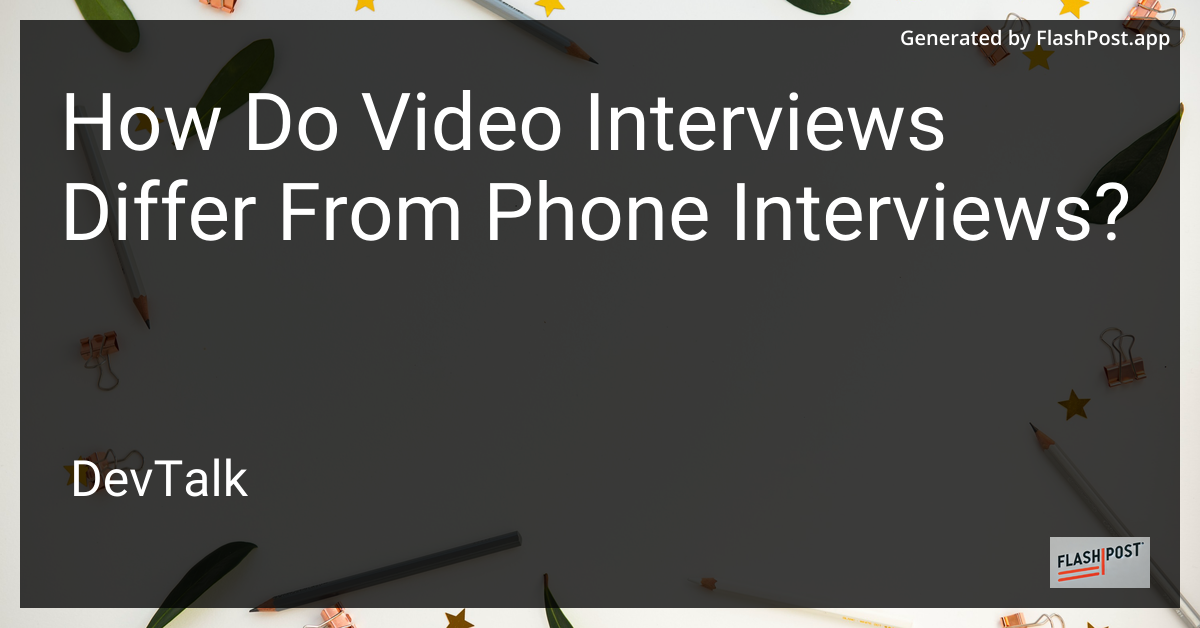How Do Video Interviews Differ From Phone Interviews?
 # How Do Video Interviews Differ from Phone Interviews?
# How Do Video Interviews Differ from Phone Interviews?
In the evolving landscape of job interviews, technology plays a key role in shaping the process.
As we delve into two of the most prevalent methods—video interviews and phone interviews—it’s crucial to understand how they differ. These differences can significantly impact your preparation and performance, potentially influencing the outcome of your job search.
Format and Presentation
Video Interviews
Video interviews are increasingly popular due to the ability to simulate in-person interactions. Here, visual aspects carry weight. Your attire, background, and body language provide non-verbal cues that can strongly influence the interviewer's perception.
- Dress for Success: Attire should match the company culture and role. Consider it as a full-fledged interview.
- Professional Background: Choose a quiet, well-lit space free of distractions to convey professionalism.
- Body Language: Eye contact, gestures, and posture all contribute to the impression you make.
Phone Interviews
Without visual components, phone interviews hinge on verbal communication. This format emphasizes your speaking abilities and listening skills, as there are no visual cues to rely on.
- Clear Communication: Articulate clearly, and use a calm and steady tone.
- Listening Skills: Ensure active listening by responding appropriately and asking clarifying questions if needed.
- Verbal Responses: Since gestures and facial expressions are not visible, it's crucial to express engagement and interest through words and tone alone.
Technological Considerations
Video Interviews
- Reliable Hardware and Software: Stable internet connection and functionality of your webcam and microphone are imperative.
- Platform Familiarity: Familiarize yourself with the interview platform (e.g., Zoom, Skype) to avoid technical glitches.
- Backup Plan: Have a contingency plan if technical issues arise, like switching devices or having the phone number ready to call on if needed.
Phone Interviews
- Phone Reception: Ensure good cellular reception to avoid dropped calls and poor audio quality.
- Landline Usage: If possible, use a landline to minimize potential connectivity issues.
- Battery Life: Ensure your phone is fully charged to avoid interruptions.
Interaction Dynamics
Video Interviews
Video interviews facilitate a personal connection, akin to face-to-face interactions. Non-verbal communication can enhance rapport and engagement.
- Non-Verbal Cues: Leverage facial expressions and nods to show attentiveness.
- Visual Interaction: Use visual aids if possible, like slides or digital demonstrations, to enrich your responses.
Phone Interviews
In contrast, phone interviews are devoid of visual interaction, making it essential to establish rapport through voice alone.
- Expressive Tone: Ensure that your enthusiasm and interest are conveyed through vocal inflection.
- Pausing for Responses: Allow pauses for the interviewer to engage and provide feedback or questions.
Conclusion
Understanding the distinct nuances between video and phone interviews can empower candidates to tailor their preparation accordingly. Acknowledging these differences can enhance your effectiveness and confidence during the interview process.
For further reading, consider exploring additional resources on interview preparation:
By leveraging this knowledge and continuing your preparation, you stand a better chance of acing your interviews and securing your desired position.